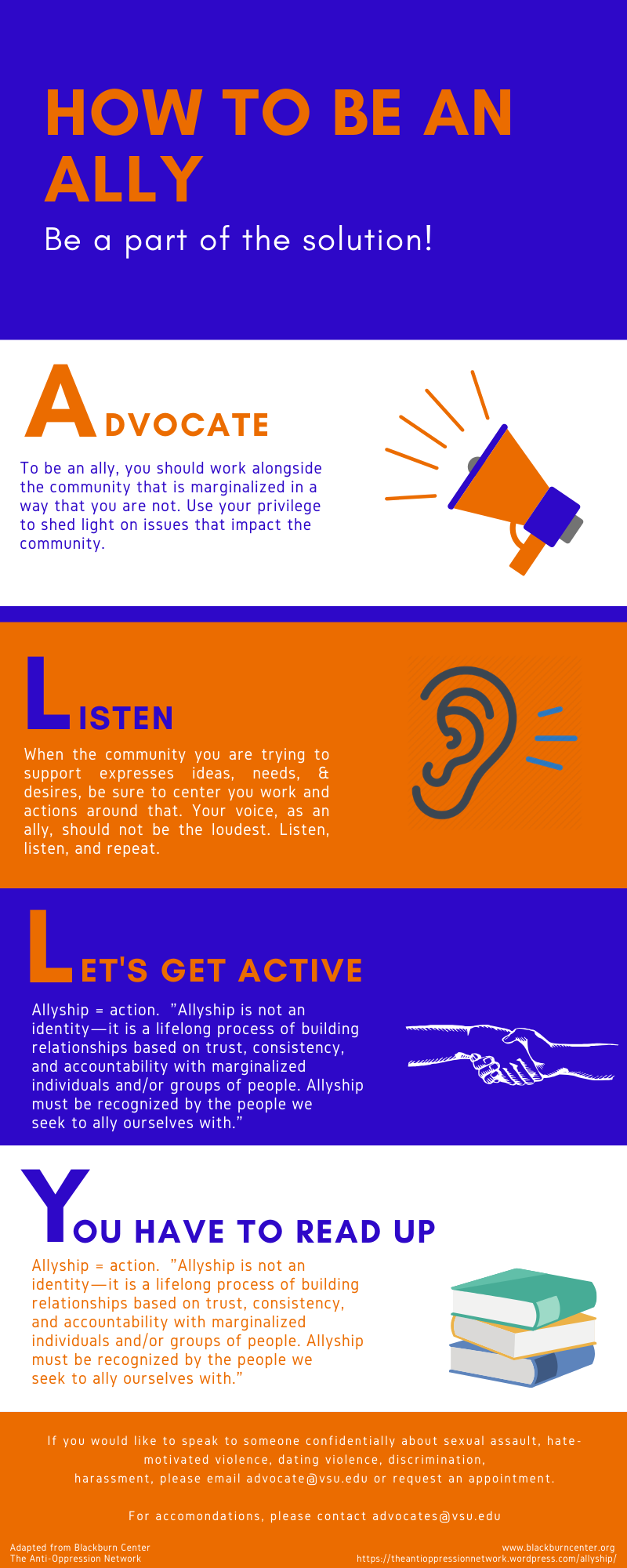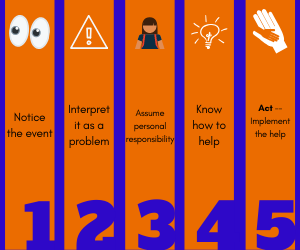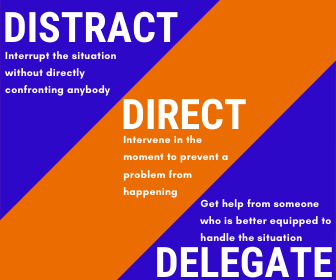Supporting a Friend

Students who experience violence, harassment, discrimination, and/or abuseMost survivors of sexual and relationship violence tell at least one other person, usually a friend. You can't rescue your friend or solve their problems. But being there to listen, believe and support your friend can positively impact their healing journey. The following suggestions and information can help you be a supportive friend and ally.
Listen and Support
When a friend shares someone has hurt them, it can be tough to hear that. Although you could not be there for them when it happened, you can be there for them when they share. Remember, you can't rescue your friends or solve their problems. You can only provide support.
- Support and understanding are essential. It takes a lot of courage for to share their experience;
- Try to provide a safe and non-judgmental environment, emotional comfort, and support for them to express feelings;
- Let them know that they can talk with you. Listen. Don’t rush to provide solutions.
Believe your friend
All too often people do not share about the violence, harassment, and/or abuse they experience due to fear of not being believed. People rarely lie or exaggerate about abuse; if someone tells you, it’s because they trust you and needs someone to talk to.
- People rarely make up stories of abuse. It is not necessary for you to decide if they were “really hurt.” If your friend says they were hurt, that should be enough;
- Believe what your friend tells you. It may have been difficult for them to talk to you and trust you.
Reassure
- Sexual assault, dating violence, harassment and discrimination is NEVER the survivor’s fault. No one asks for "it" by what they wear, say or do. Let your friend know that only the perpetrator is to blame;
- Your friend needs to hear that fears, anxieties, guilt, and anger are normal, understandable and acceptable emotions;
- Remember, no one ever deserves to be abused or harassed.
Be Patient
- Don’t press for details – let your friend decide how much they want to share. Ask them how you can help;
- Your friend may struggle with complex decisions and feelings of powerlessness, trying to make decisions for them may only increase that sense of powerlessness.
- You can be supportive by helping your friend to identify all the available options and then help by supporting their decision-making process.(A person that can describe a problem, has the ability to describe a solution, they just need time, space, and resources" - Fatima M. Smith)
- Your friend can’t just “forget it” or just move on. Recovery is a long term process and each individual moves at their own pace.
Encourage
- Remind your friend they may seek medical attention, report the assault/harassment, and or contact a VSU Advocate. Remember, your friend must ultimately make the decision as to what to do. They are the expert in their own lives. Don’t push. Remember, support your friend’s choices no matter what they decide.
Respect Privacy
- Don’t tell others what your friend tells you. Let the individual decide who they will tell. It is important not to share information with others who are not involved;
- If you do need to share information for your friend’s safety, get permission by letting your friend know what you will share and with whom it will be shared;
- Don’t confront the perpetrator. Though you might want to fix the situation or get back at the abuser, this could make things worse, for you and your friend.
Establish Safety
- Assist your friend with re-establishing their sense of physical and emotional safety. Ask your friend what would make they feel safe and how you can help them accomplish this.
- If the abuse, stalking or harassment is ongoing, help your friend to develop a plan of what to do if they are in immediate danger. Having a specific plan can be helpful.
- A VSU Advocate can assist with creating safety plans that are specific to the situation and individuals involved.
Things you can say
There are never enough words or the right words when a friend shares something bad has happened to them. Refrain from asking a lot of questions, instead, support your friend with these suggested phrases:
- It’s not your fault
- Thank you for trusting me with this
- I believe you
- How can I support you?
- I am glad you told me
- I’ll support your choices
- You're not alone
Get support for yourself
Sometimes the family and friends of victims can also feel the impact of the crime and experience emotional and physical reactions. This is called secondary victimization. Hearing about relationship abuse, sexual assault, and stalking can be upsetting. You may feel angry, sad, frustrated, and helpless. If you have experienced crime or other traumatic events in the past, your friend’s experience might bring up memories and feelings of that time. You may want to talk about your feelings but also respect your friend’s privacy. You too can contact VSU Advocates and speak to an advocate confidentially to get help for yourself. Remember, you can't rescue your friend or solve their problems. But being there to listen, believe and support your friend in a positive way can greatly influence their healing process.
Bystander Intervention Strategies
Many of us have witnessed a situation or heard of a situation where we wanted to intervene, but for various reasons did not. This situation is more common than you might think and is known as the “bystander effect.” It is especially common in group settings, where everyone assumes someone else will do something or assumes that it's none of your business.
VSU wants Trojans to support Trojans by being positive bystanders also known as UPstanders. Bystander Intervention can take place before, during, and after an incident. If you see/know something, do something.
Below are the five steps to overcoming the bystander effect and doing something to make a difference in the life of a community member:

The 3 D’s of Bystander Intervention provide a quick reference for ways to safely intervene. Depending on the situation you may need to use one, some, or all of the D’s. Your safety and the safety of others should be considered when you are determining how to intervene.
